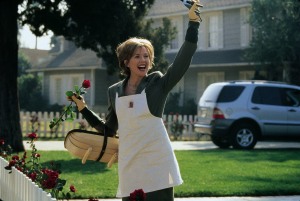
There is something to be said for the movies of the 1940s and 1950s. There we had a family-orientated culture in the traditional sense that pervaded the society. Since the 1960s there has been a deconstruction of the traditional family unit to widen the application of family unit.
In American Beauty, we are given an everyday middle-class dysfunctional family. Dysfunctional. Is this now being honest?
A family that is on the brink. At the other end, there is the Brady Bunch rosy view of family life where nothing goes wrong.
But coming out of the theatre, I was unconvinced by American Beauty. The problem is that the film has gone to extremes and what was missing was a better sense of reality. However, in a sense, one is charmed by this black comedy/drama. The film may or may not be hilarious, it depends if you can laugh convincingly with it, which I did not, as it satirises the midlife crisis in a middle-class man. In doing so, it attempts to pull the blinds on what is a normal and conventional American suburban family, but what is an entanglement of dysfunctional behaviour, or extreme behaviour. Family warts and all. Some people found this offensive and a backward step in society as the traditional family unit is what safeguards society. However, that is not the case with American Beauty.
The Story
The “coming of age” of its forty-year-old protagonist, frustrated and discontented Lester Burnham (Kevin Spacey in a smart performance), is told through his eyes. Once, Burnham tries to relive his teenage years by teaming up with 18-year-old next door neighbour Ricky Fitts (Wes Bentley), a supplier of drugs and who video tapes his daughter, Jane (Thora Birch). Hardly wholesome viewing, but extreme.
Burnham’s daughter Jane feels neglected by her father, who pays undue and incestuous attention to her teenage friend, Angela (Mena Suvari). This is edgy stuff, but somehow unreal. To make matters more complex, Burnham quits his job, takes up honesty as a virtue, and works in a takeaway, while he and his wife (Annette Bening) are collapsing at the seams. She panders to the notion that she is the only together person in the family but uses pop psychology so she believes she can sell real estate while having an affair with a hot shot competitor to climb the ladder. This a family breakdown. Comedy, anyone?
Themes
American Beauty may get a few laughs but at the same is tragic so it is kind of a half-hearted laugh—at least it is written in such a way that one can see that humour is attempted.
Thematically, the movie has observed the dilemma adolescents at the time experienced under the roof of their parents who seemingly have never been through what they have but are going through their own crises. The adults criticize their sons and daughters but have their own problems that they never been dealt with. In that sense, American Beauty expels the myth of Brady Bunch Americana and refuses to accept that families are together.
Times changed since The Waltons. There are indeed extreme families.
Going Deeper
But, at a deeper level, American Beauty is aware of a nagging void in the American heart.
The film’s central proposition, alluded to in the title, tries to offer hope. As all the adult characters are falling apart around him, it is the rejected and unusual young person, Ricky Fitts that significantly (because he is young) gets the meaningful monologue in the film:
“Yesterday, I realised that there was this entire life behind things. And this incredibly benevolent force wanted me to know that there was no reason to be afraid, ever. Maybe it is a poor excuse, I know, but it helps me remember. I need to remember. Sometimes there is so much beauty in the world I feel like I can’t take it. And my heart is just going to cave in.”
The dramatic effect of the scene is told from the point of view of the film’s moral anchor: Ricky, perceptive of others and denouncing hypocrisy, he is not moral in the traditional sense, but has an authority and stability that seems beyond his years. Quiet and shunned, he is hurting, but thoughtful. While his father’s generation created a world that is now looked upon by Ricky’s generation as out of date and narrow, Ricky’s ‘revelation’ comforts him. There is more to the life he has known.
Rated R for strong sexuality, language, violence, and drug content. Starring: Kevin Spacey, Annette Bening, Chris Cooper, Wes Bentley, Thora Birch, and Mena Suvari. Writer: Allan Ball. Director: Sam Mendes. Released September 17, 1999.